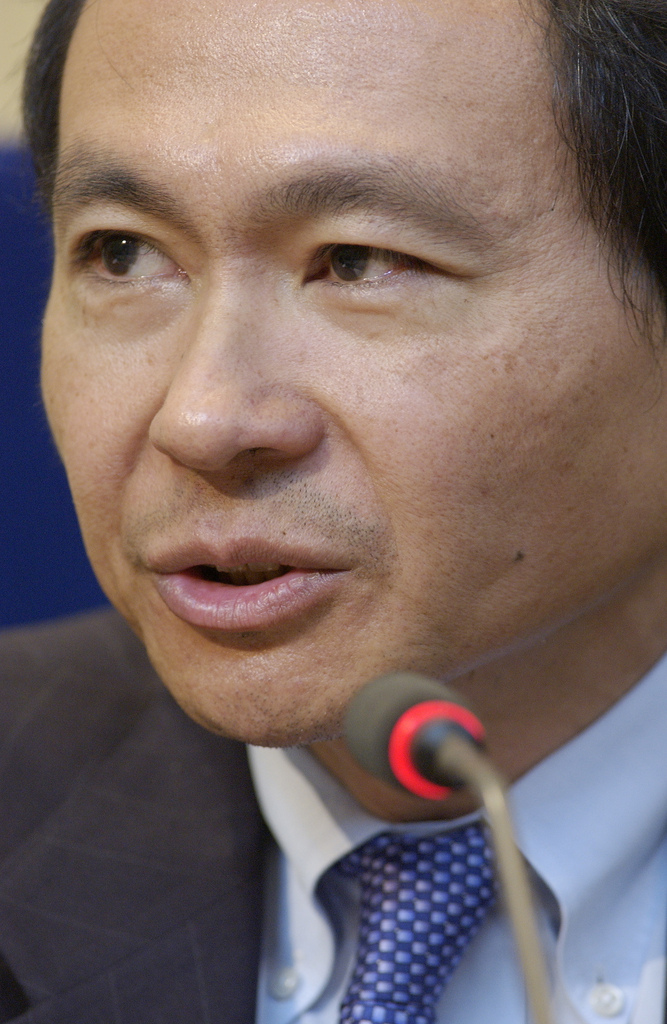10 Steps to Restoring the Common Trust
Posted on December 9, 2015

"Francis Fukuyama 2005" by Robert Goddyn - received by email. Licensed under CC BY-SA 3.0 via Commons - https://commons.wikimedia.org/wiki/File:Francis_Fukuyama_2005.jpg#/media/File:Francis_Fukuyama_2005.jpg
Originally published on the Crispin Solutions blog on July 11, 2015.
Also published on the Washington Examiner.
by Rob Wasinger and Brian Robertson
Twenty years ago, in his bestselling social critique Trust, Francis Fukuyama identified the breakdown of the underlying principles that foster social and economic prosperity, what he defined as "social trust."
Today, the crisis of social trust in the United States is more acute than ever before. The gulf has widened alarmingly between the haves and have-nots, the powerful and the powerless, those with influence and those whose attachment to social institutions — and to our political order — has become increasingly tenuous. The conviction that the game has been rigged on behalf of well-connected and well-financed special interests has grown to the point that trust in the justice and efficacy of our major institutions is at an all-time low. We see manifestations of this phenomenon in the Tea Party movement, in the unrest sparked by law enforcement actions in Ferguson and Baltimore, and — perhaps most clearly — in an increasingly polarized and uncivil public debate over how we should order our affairs as a country.
The crisis of trust in America and the crisis of political leadership are two sides of the same coin. Never before have our public servants been more mistrusted, and for good reason. The plain fact is that our political leadership has contributed mightily to the breakdown of social trust that characterizes our present dilemma. Arbitrary and petty laws that infringe upon our day-to-day freedoms, systemic corruption epitomized by states and municipalities balancing budgets with the collection of fees and fines for petty civil violations, litigation aimed at intimidation rather than justice, a dangerously decrepit national infrastructure, and a growing Surveillance State that confuses the collection of information about its own citizens with national security — all of these unfortunate developments could not have occurred without the complicity or the active direction of our political leaders.
But while politicians have been complicit in the decline in social trust, they will also have an essential role in restoring that trust. It is imperative that we find ways to repair this disconnect with new policies, new ideas and new political approaches (as well as a new policy language) designed to help strengthen the broad American middle class. The project of restoring the common trust will require a new set of policy priorities that directly address the sources of the collapse in public confidence in our essential democratic institutions, including government. In that spirit, The Common Trust agenda calls for:
- a reflective foreign policy that respects the universal principles of human rights as a central point of engagement;
- a criminal justice system willing to risk rehabilitation and even second chances for human beings who are otherwise cogs in a for-profit "corrections system";
- a system of law enforcement that engages the community it protects rather than intimidates it with brute force;
- an electoral system that better represents the democratic aspirations of the populace by more closely approximating the ideal of "one person one vote";
- an entitlement system that serves as a safety net for the truly needy rather than an income supplement for politically connected constituencies;
- an immigration system that respects the human longing for a better life and a more secure future, bringing to a halt the current regime based on economic exploitation of, and denial of basic rights and legal protections to, vulnerable populations.
- a legal regime that respects the discretion and independence of the judiciary, without the imposition of sentencing requirements such as mandatory minimums and "zero tolerance," failed concepts that have given rise to the severe inequities in the treatment of our fellow citizens;
- an infrastructure that is the best in the world, essential to economic growth, global competitiveness and the socio-economic mobility of all of our citizens;
- an economic system that provides decent work at a decent wage to those who struggle to live a dignified existence, particularly those in poor traditionally disadvantaged communities; and
- a system of national security that puts a priority on strategic reduction of risk rather than the wholesale data collection and tracking of movements that characterizes our current regime.
In short, we need a policy agenda aimed first and foremost at restoring our common trust by establishing a clear priority for the common good. It is an agenda that seeks to obtain a purchase on the moral imagination of our fellow citizens who desire to be included in the American Dream, not shunted to the margins of society. It is an agenda that seeks to revive that Dream for all.
Rob Wasinger is executive director of The Common Trust. Brian Robertson is CEO of Crispin Solutions, a public affairs and communications consulting firm, and co-founder of The Common Trust. Thinking of submitting an op-ed to the Washington Examiner? Be sure to read our guidelines on submissions.
